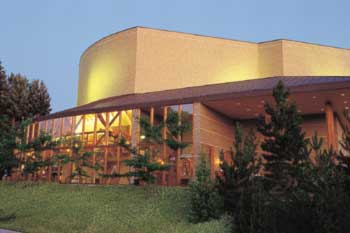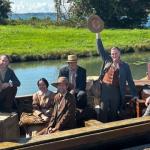
I’ve fallen a bit behind, so it’s high time to catch up:
These two pieces appeared on Friday on the Interpreter Foundation’s completely comatose website:
“Restoring Melchizedek Priesthood,” written by John S. Thompson
Abstract: Church historical sources make four differing claims as to when, how, and by whom Melchizedek priesthood was restored. These seemingly conflicting sources have led to many theories about what happened, including the idea that Joseph Smith changed his narrative and rewrote history as his ideas of priesthood evolved. A closer look at the sources, more carefully defining the terminology, and being more aware of ancient patterns provide a better solution for understanding the purpose and relationship of these four narratives and thus the nature of the Melchizedek priesthood Joseph Smith restored.
“Interpreting Interpreter: Portions of Priesthood,” written by Kyler Rasmussen
This post is a summary of the article “Restoring Melchizedek Priesthood” by John S. Thompson in Volume 62 of Interpreter: A Journal of Latter-day Saint Faith and Scholarship. All of the Interpreting Interpreter articles may be seen at https://interpreterfoundation.org/category/summaries/. An introduction to the Interpreting Interpreter series is available at https://interpreterfoundation.org/interpreting-interpreter-on-abstracting-thought/.
The Takeaway: Thompson argues that the apparent contradictions in the modern restoration of the Melchizedek priesthood reflect a consistent order in which portions of priesthood authority are granted to accomplish specific purposes, with the authority of apostles (to establish new church units), elders (to confirm the churches by giving the gift of the Holy Ghost), and high priests (to govern God’s kingdom) culminating in a fullness of priesthood power as outlined in the ordinances of the temple.
And this item appeared on Wednesday, if I’m not mistaken. on the website of the completely moribund Interpreter Foundation: Hugh Nibley Observed: “The BYU Folklore of Hugh W. Nibley,” written by Jane D. Brady
“It is not surprising that the hero which the BYU community has chosen to revere through its stories is Professor Hugh W. Nibley, a man who has excelled in both scholarly and religious pursuits. Nibley’s genius and devotion have combined with his eccentricity and absentmindedness to create a man of legends.”
Part of our book chapter reprint series, this article originally appeared in Hugh Nibley Observed, edited by Jeffrey M. Bradshaw, Shirley S. Ricks, and Stephen T. Whitlock. For more information, go to https://interpreterfoundation.org/books/hugh-nibley-observed/.

Yesterday, in the afternoon, we saw the well-acted two-person play The Mountaintop, written by Katori Hall. The play is set entirely in Room 306 of the Lorraine Motel in Memphis, Tennessee, on the last night of the life of the Reverend Dr. Martin Luther King, Jr.
“We’ve got some difficult days ahead,” he had told an overflowing crowd in Memphis, Tennessee, on 3 April 1968, where the city’s mostly-Black sanitation workers were striking. “But it really doesn’t matter with me now, because I’ve been to the mountaintop . . . I’ve seen the Promised Land. I may not get there with you. But I want you to know tonight, that we, as a people, will get to the Promised Land.” Less than twenty-four hours after that speech, he was assassinated by James Earl Ray. He was only thirty-nine years old.
For the evening play, we saw a performance of Shakespeare’s The Winter’s Tale. It’s far from being my favorite among his plays, but, with a few weaknesses in casting and occasional problems with voice projection, it was a very solid production.
We’re just back from this evening’s performance — the last that we’ll be seeing here this season — of Shakespeare’s The Taming of the Shrew. It was a good production of a deeply, deeply sexist play. I’m rather surprised, although I’m also pleased, that it’s still scheduled and performed, and that it wasn’t ringed with protesters.
Caitlin Wise, who played the role of Kate (aka the “Shrew”), was very good, as was John DiAntonio, who played Petruchio. He is also the new artistic director for the Utah Shakespeare Festival, and I’m told that he and Caitlin Wise are married. So it was good to “meet” them for the first time.
Our favorite play of the Festival, though, without doubt — we were sadly unable to fit the Festival’s seventh play, The 39 Steps, into our schedule this year — was Shakespeare’s Much Ado about Nothing, which we saw earlier Saturday afternoon It was extremely well done and is, simply, just an all-around good play. Melinda Parrett and Walter Kmiec were outstanding as, respectively, Beatrice and Benedick. We had a very, very good time, and I recommend it to you.
One of the good things about coming to Cedar City each year for the Shakespeare Festival is meeting up with old friends. Last night, we had dinner with members of the family who first gave me the idea of attending such a festival. Their eldest son is a friend of mine from before our missions. (By the way, he actually attended my wedding in the Salt Lake Temple.) Before my marriage, they invited me to attend the Ashland Shakespeare Festival in Oregon with them. I loved it. Happily, I married a theater major, so it wasn’t difficult to convince her that regularly attending the Festival here in Cedar City would be a good idea.
He was there with members of his family for dinner last night, and then just the three of us had dinner together tonight. And — dare I say this? I really don’t like to expose innocent friends to the sneers and assaults of my obsessive, anonymous online detractors — his mother, who will celebrate her ninety-seventh birthday later this year, regularly plays Broadway tunes on the piano in the lobby of the Randall Jones Theater before afternoon performances there. She doesn’t have the music in front of her when she plays; she does it from memory. And what most astonishes me is that she can carry on effortless conversation while she does it. She served at least two, possibly three, international missions with her late husband, a physician, and she herself earned a doctorate in psychology. If Superwoman actually exists, my wife and I know where she lives.
And it’s been fun to meet with others here, as well. During the intermission of Much Ado about Nothing, the father of a former student introduced himself to me. She has gone on to earn her own doctorate, teach at the college level, and have several children. And tonight, when my wife and I stopped off at a Maverik store for something to drink back at our motel, one of this blog’s readers came up and introduced himself. He was very generous, and I enjoyed meeting him.
Posted from Cedar City, Utah












